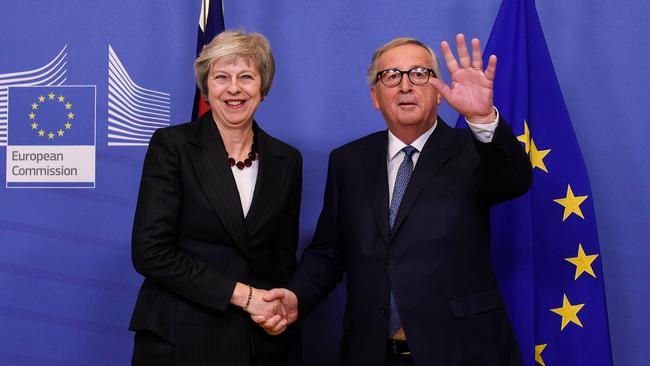European Union gives green light to Brexit draft
The EU and Britain have agreed on a draft declaration on the future of their political relations after Brexit.

The EU and Britain last night agreed on a draft declaration on the future of their political relations after Brexit.
The two sides also agreed to a draft deal extending the transition period by one or two years beyond the end of 2020, a final sticking point of the divorce deal.
European Council president Donald Tusk said the way was now open for an EU summit this weekend to rubber-stamp the deal.
Downing Street said Prime Minister Theresa May was holding a teleconference with cabinet ministers about the agreement, and she was to make an “emergency statement” overnight.
If the withdrawal agreement and the political declaration are signed at the Brussels summit on Sunday, Mrs May will then turn her attention to getting the deal through the British parliament.
The draft declaration was agreed upon by negotiators and endorsed by the European Commission, the EU’s executive arm overseeing Brexit negotiations.
Mr Tusk, who chairs meetings of EU leaders, said he had sent the draft political declaration to Britain’s 27 European partners for endorsement on Sunday, seen as a pivotal moment for Brexit.
Britain officially leaves the EU at midnight on March 29, but a Brexit deal must be agreed on in coming weeks to leave enough time for the European and British parliaments to endorse it.
A draft copy of the declaration to be signed on Sunday, and leaked to London’s Telegraph, shows it will be “ambitious, broad, deep and flexible” and indicates that Mrs May wants a Canada-plus style future after Brexit.
The future relationship will cover trade, law enforcement, criminal justice, foreign policy, security and defence.
One of the clauses of the future relationship says both sides should strive for an ambitious, comprehensive and balanced trade deal including services. This “should aim to deliver a level of liberalisation in trade in services well beyond the Parties’ World Trade Organisation commitments and building on recent Union Free Trade Agreements”, the draft says.
A potential sticking point emerges where it says there should be no tariffs in reference to a customs union. Mrs May is under sustained pressure to rework the Irish backstop that allows for such a customs union because there is no means for the country to get out of it without approval of the EU.
Mrs May and European Commission chief Jean-Claude Juncker met for talks in Brussels for two hours on Wednesday night.
German Chancellor Angela Merkel earlier told the German parliament that she was ready to approve the Brexit deal but acknowledged problems, particularly regarding Spain.
“We know how difficult the discussions are in Britain, but I can say for Germany that we will agree to this exit agreement. We still have an objection in Spain. I can’t say exactly how we solve this issue, but I hope it will be solved by Sunday,” Mrs Merkel said. “We want — and that is in our fundamental interests — to have a good relationship with Britain in the future too.”
Mrs Merkel also highlighted difficult discussions that have created dramas within Britain: the need for both the EU and the UK to jointly agree to exit the Customs Union if it is imposed as part of the backstop on Ireland.
“I think rightly, we have placed value on Britain not being able to decide unilaterally when it ends the Customs Union, but rather that Britain together with the EU defines this date and afterwards the future relationship into effect,” Mrs Merkel said.
Yesterday it appeared some of the concerns from Spain over Gibraltar may have been assuaged by negotiators on the sidelines in Brussels, including changing the British territory’s favourable tax regime to be more in line with Spain.
Spanish Prime Minister Pedro Sanchez has yet to publicly confirm this. Earlier Mr Sanchez had said of the deal: “This (Gibraltar) is an essential point and if this is not resolved then unfortunately Spain will not be able to vote in favour of it.”
France and The Netherlands have raised other worries that the deal doesn’t adequately address future fishing rights to protect the access of their fleet into British waters. But the loose wording on the issue in the Brexit deal allowed Mrs May to convince some cabinet members to back her plan and if the fish debate continues, it will make selling the Brexit deal to the British parliament that much harder.
With AP



